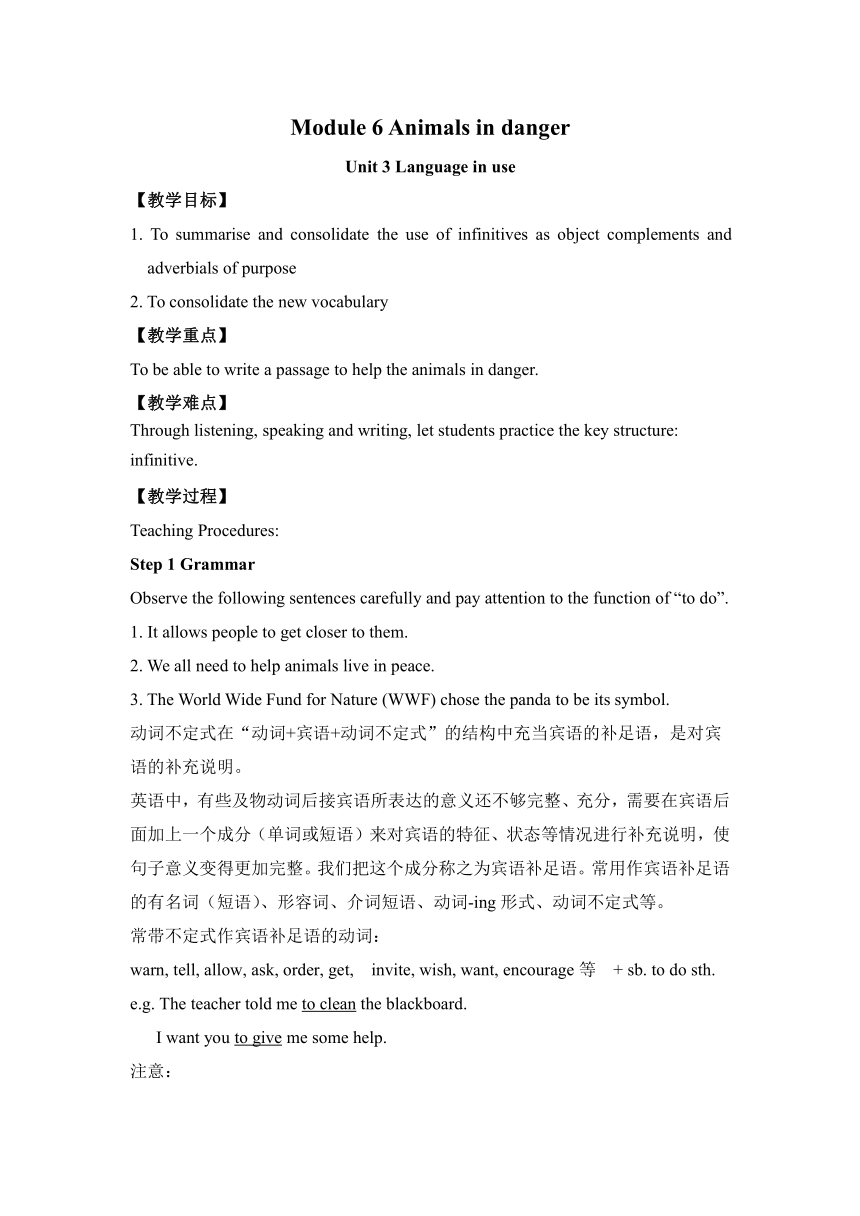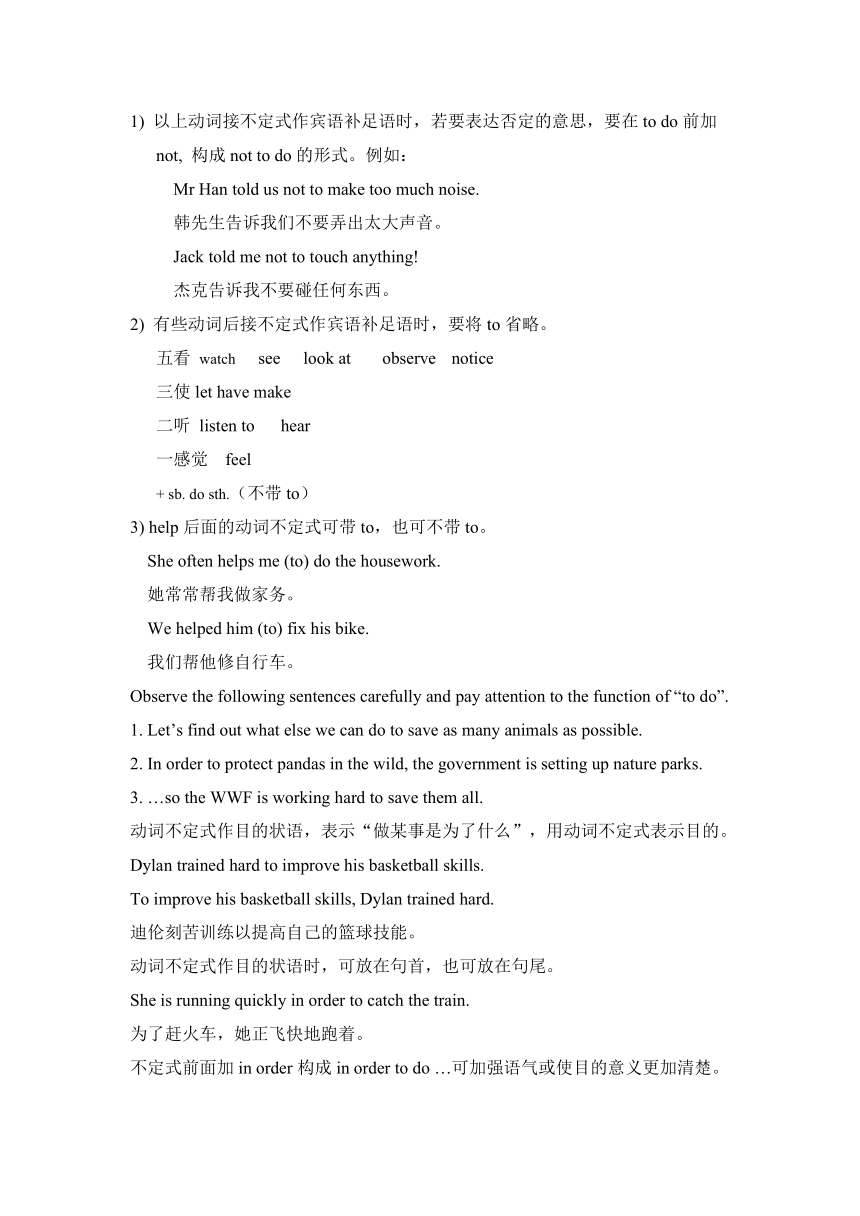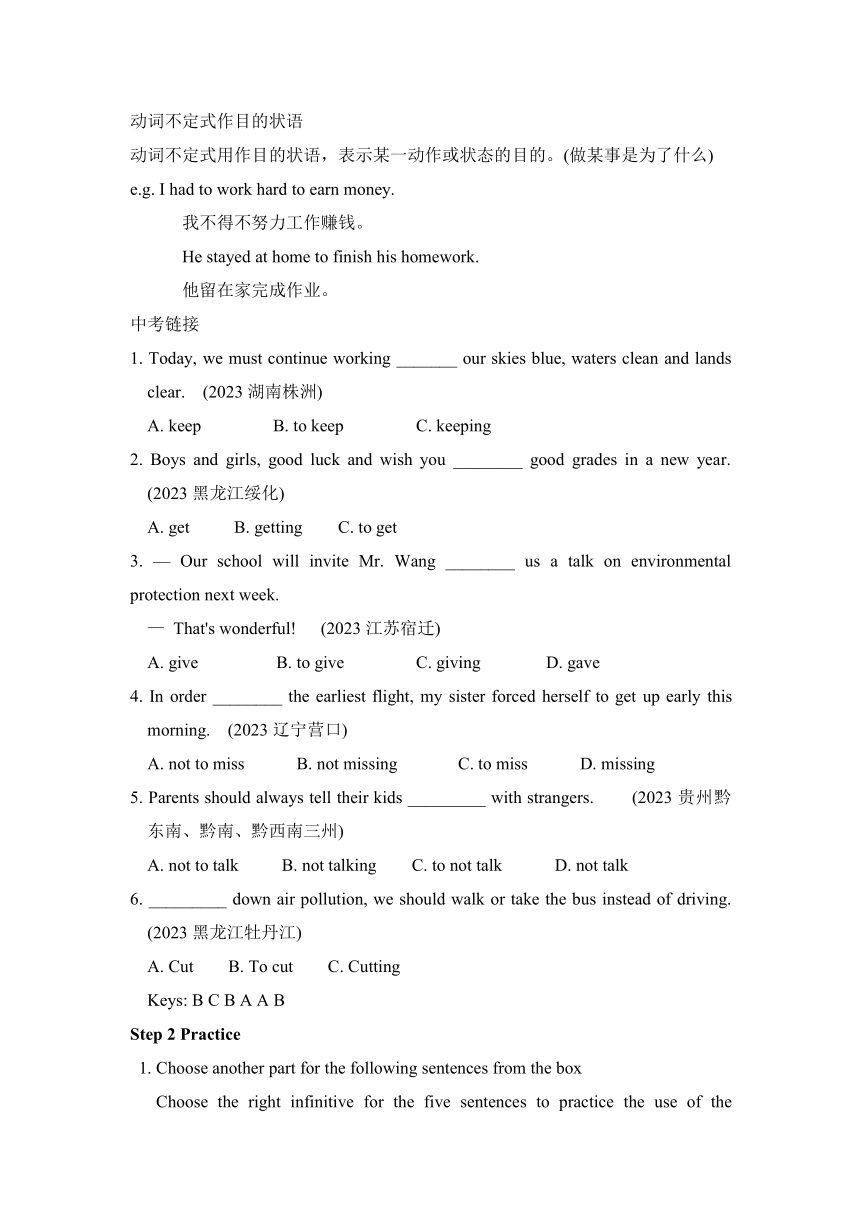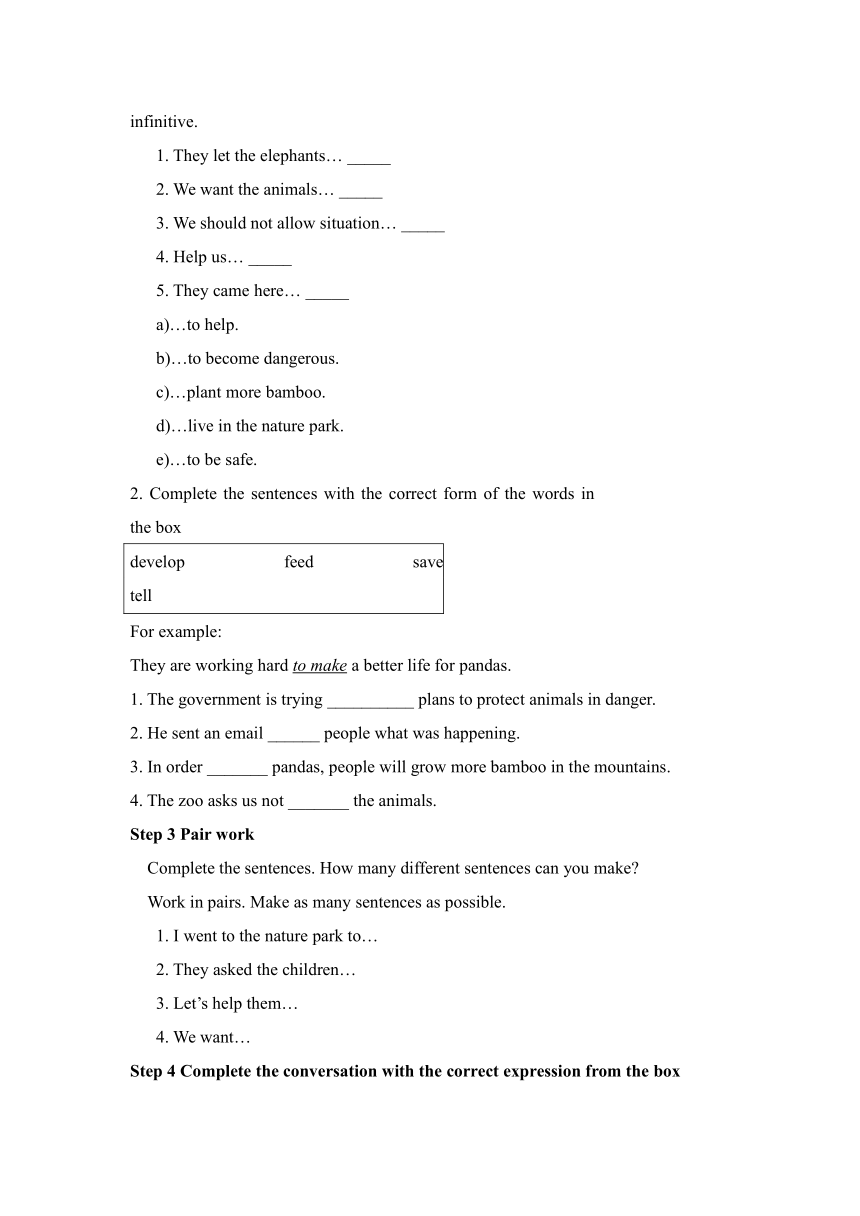Module 6 Animals in danger Unit 3 Language in use 教案
文档属性
| 名称 | Module 6 Animals in danger Unit 3 Language in use 教案 |

|
|
| 格式 | docx | ||
| 文件大小 | 24.4KB | ||
| 资源类型 | 教案 | ||
| 版本资源 | 外研版 | ||
| 科目 | 英语 | ||
| 更新时间 | 2024-08-16 00:00:00 | ||
图片预览




文档简介
Module 6 Animals in danger
Unit 3 Language in use
【教学目标】
1. To summarise and consolidate the use of infinitives as object complements and adverbials of purpose
2. To consolidate the new vocabulary
【教学重点】
To be able to write a passage to help the animals in danger.
【教学难点】
Through listening, speaking and writing, let students practice the key structure: infinitive.
【教学过程】
Teaching Procedures:
Step 1 Grammar
Observe the following sentences carefully and pay attention to the function of “to do”.
1. It allows people to get closer to them.
2. We all need to help animals live in peace.
3. The World Wide Fund for Nature (WWF) chose the panda to be its symbol.
动词不定式在“动词+宾语+动词不定式”的结构中充当宾语的补足语,是对宾语的补充说明。
英语中,有些及物动词后接宾语所表达的意义还不够完整、充分,需要在宾语后面加上一个成分(单词或短语)来对宾语的特征、状态等情况进行补充说明,使句子意义变得更加完整。我们把这个成分称之为宾语补足语。常用作宾语补足语的有名词(短语)、形容词、介词短语、动词-ing形式、动词不定式等。
常带不定式作宾语补足语的动词:
warn, tell, allow, ask, order, get, invite, wish, want, encourage等 + sb. to do sth.
e.g. The teacher told me to clean the blackboard.
I want you to give me some help.
注意:
1) 以上动词接不定式作宾语补足语时,若要表达否定的意思,要在to do前加not, 构成not to do的形式。例如:
Mr Han told us not to make too much noise.
韩先生告诉我们不要弄出太大声音。
Jack told me not to touch anything!
杰克告诉我不要碰任何东西。
2) 有些动词后接不定式作宾语补足语时,要将to省略。
五看 watch see look at observe notice
三使let have make
二听 listen to hear
一感觉 feel
+ sb. do sth.(不带to)
3) help后面的动词不定式可带to,也可不带to。
She often helps me (to) do the housework.
她常常帮我做家务。
We helped him (to) fix his bike.
我们帮他修自行车。
Observe the following sentences carefully and pay attention to the function of “to do”.
1. Let’s find out what else we can do to save as many animals as possible.
2. In order to protect pandas in the wild, the government is setting up nature parks.
3. …so the WWF is working hard to save them all.
动词不定式作目的状语,表示“做某事是为了什么”,用动词不定式表示目的。
Dylan trained hard to improve his basketball skills.
To improve his basketball skills, Dylan trained hard.
迪伦刻苦训练以提高自己的篮球技能。
动词不定式作目的状语时,可放在句首,也可放在句尾。
She is running quickly in order to catch the train.
为了赶火车,她正飞快地跑着。
不定式前面加in order构成in order to do …可加强语气或使目的意义更加清楚。
动词不定式作目的状语
动词不定式用作目的状语,表示某一动作或状态的目的。(做某事是为了什么)
e.g. I had to work hard to earn money.
我不得不努力工作赚钱。
He stayed at home to finish his homework.
他留在家完成作业。
中考链接
1. Today, we must continue working _______ our skies blue, waters clean and lands clear. (2023湖南株洲)
A. keep B. to keep C. keeping
2. Boys and girls, good luck and wish you ________ good grades in a new year. (2023黑龙江绥化)
A. get B. getting C. to get
3. — Our school will invite Mr. Wang ________ us a talk on environmental protection next week.
— That's wonderful! (2023江苏宿迁)
A. give B. to give C. giving D. gave
4. In order ________ the earliest flight, my sister forced herself to get up early this morning. (2023辽宁营口)
A. not to miss B. not missing C. to miss D. missing
5. Parents should always tell their kids _________ with strangers. (2023贵州黔东南、黔南、黔西南三州)
A. not to talk B. not talking C. to not talk D. not talk
6. _________ down air pollution, we should walk or take the bus instead of driving. (2023黑龙江牡丹江)
A. Cut B. To cut C. Cutting
Keys: B C B A A B
Step 2 Practice
1. Choose another part for the following sentences from the box
Choose the right infinitive for the five sentences to practice the use of the infinitive.
1. They let the elephants… _____
2. We want the animals… _____
3. We should not allow situation… _____
4. Help us… _____
5. They came here… _____
a)…to help.
b)…to become dangerous.
c)…plant more bamboo.
d)…live in the nature park.
e)…to be safe.
2. Complete the sentences with the correct form of the words in the box
develop feed save tell
For example:
They are working hard to make a better life for pandas.
1. The government is trying __________ plans to protect animals in danger.
2. He sent an email ______ people what was happening.
3. In order _______ pandas, people will grow more bamboo in the mountains.
4. The zoo asks us not _______ the animals.
Step 3 Pair work
Complete the sentences. How many different sentences can you make
Work in pairs. Make as many sentences as possible.
1. I went to the nature park to…
2. They asked the children…
3. Let’s help them…
4. We want…
Step 4 Complete the conversation with the correct expression from the box
1. Read the expressions in the box.
2. Read the dialogue carefully, then choose the correct one.
a) shall we meet b) to ask me c) to protect them
d) to see a film e) will it start
Tony: Hi, Tony speaking.
Daming: Hi, Tony. It’s Daming. Do you want (1)____ this evening
Tony: Oh, it’s very nice of you (2) ___. What’s the film about
Daming: It’s about animals in danger, and what the government is doing (3) ____.
Tony: Oh, I’d like to see it. I’m doing my homework about that. What time (4) ___
Daming: At eight o’clock.
Tony: So what time (5) ____
Daming: At half past seven, outside the school gate.
Tony: OK. See you then.
Daming: See you.
Step 5 Complete the sentences with the correct form of the words in the box
1. Read the phrases in the box.
2. Complete the sentences with the correct form of the phrases from the box.
believe, make, protect, stop, think
Tigers are beautiful animals, but they are in danger. It’s hard (1) ________ that there are only about one hundred South China tigers left on earth — and few live in the wild. Why is the situation so serious What should we do (2) _________ the tigers People need (3) ________ about these questions carefully.
(4) ________ it easier for the tigers to live, we should protect their home in the wild. We should work hard (5) _______ people killing tigers. If we can do these things well, there will be more tigers on earth.
Step 6 Complete the sentences with the expressions in the box
Read the sentences and fill in the right expressions.
in danger, in order to, in peace, in the wild
1. Animals in many places around the world are _________.
2. We can help animals to live safely __________.
3. Let’s leave the animals in nature parks _______.
4. We should try hard __________ save animals.
Step 7 Listening
Listen and complete the poster
1. Read the words and guess what’s missing.
2. Listen and complete the poster.
● Wildlife Club ●
1. We started this club because we want to _____________________.
2. We started this club in order to ______________________.
3. We would like more students to ____________________.
4. We want to decide _________________________.
5. We need to tell people about _________________.
Come and join us!
Step 8 Reading
Read the email and choose the correct answer
1. Read the email and get the main idea.
2. Choose the correct answer to the three sentences.
1. Sally is writing to her _____.
a) aunt b) teacher c) friend
2. Marwell Wildlife helps ______.
a) animals in danger b) scientists c) visitors
3. Scientists do research about _____.
a) feeding animals
b) working with animals
c) protecting animals
Step 9 Around the world
Know about the animals in danger.
Answer the questions.
1. What does the blue whale feed on
2. How many blue whales are left
3. Where dose the wild Bactrian camel live
4. How many Bactrian camels are left
Step 10 Discussion
Discuss what you want people to know about the wildlife club
Work in groups. Discuss the following questions:
what animals you’re going to help.
when you’re going to meet.
what you’re going to do.
where you’re going to meet.
Step 11 Pair work
Make a poster about your wildlife club
Work in pairs. Let Ss make a poster together and choose the best one to show to the class.
Step 12 Task
Find out about the animals you want to help and add information to the poster to make it more interesting
Work in pairs. Let Ss choose the animas freely and choose the best one to show.
Step 13 Summary
常带不定式作宾补的动词:
warn, tell, allow, ask, order, get, invite, wish, want, encourage等
动词+ sb. do sth.(不带to)
五看 watch see look at observe notice
三使 let make have
二听listen to hear
一感觉 feel
动词help后面的动词不定式可带to,也可不带to。
动词不定式用作目的状语,表示某一动作或状态的目的。(做某事是为了什么)
动词不定式作目的状语时,既可以放在句首,也可以放在句尾。
Step 14 Exercises
Ⅰ. 根据汉语意思完成英语句子,每空一词。
1. 这箱子太重了,我搬不动。
The box is too heavy for me _______ _______.
2. 我刚才看见李明进了教室。
I _______ Li Ming _______ the classroom just now.
3. Mary正在教她的奶奶使用抖音。
Mary is _______ her grandma _______ _______ Douyin.
4. 警察搜查了他的房子,结果什么也没找到。
The police searched his house only _______ _______ nothing.
5. 医生和护士夜以继日地工作来抢救这个小男孩。
Doctors and nurses worked day and night _______ _______ the little boy.
6. Mr Green刚才告诉他们明天的比赛不要迟到。
Mr Green _______ _______ _______ _______ _______ late for tomorrow's game just now.
Ⅱ. 根据材料内容,从方框中选择恰当的单词填空,使材料意思完整、通顺,注意形式变化。
peace, situation, danger, government, enough, grow, wild, produce, southwest, protect
The white-headed langur (白头叶猴) is one of the world's rare primate species (稀有灵长类物种). They live in the forests and mountains of Chongzuo, a city in the (1)_______ of Guangxi. They eat tree leaves and fruit and can (2)_______ to about 0.7 metres tall. They have white hair on their heads, and that's how they got their name.
White-headed langurs were in (3)_______ in the past. People cut down lots of trees in the mountains. And many white-headed langurs lost their home. They couldn't get (4)_______ food to eat, so their population became smaller. In the 1980s, there were only about 300 white-headed langurs in the (5)_______.
Later, people started to (6)_______ white-headed langurs. Scientists did a lot of research to help them (7)_______ more babies. The Chongzuo (8)_______ even set up a nature reserve for them.
After more than forty years of many people's hard work, the (9)_______ is getting better and better. The number of white-headed langurs has already increased (增加) to around 1,300. Now they can live in (10)_______ in the reserve. They don't need to worry about food or losing their home.
Ⅲ. 同学们,上面短文中提到的白头叶猴,你对它们了解多少呢?
Write and Share
Write 3 facts you found about white-headed langurs from the passage above: 1. _______________________________________ 2. _______________________________________ 3. _______________________________________
Write 2 questions you have: 1. _______________________________________ 2. _______________________________________
Try to find the answers to the 2 questions from the website: 1. _______________________________________ 2. _______________________________________
Step 15 Homework
哪些动物是濒危动物?你认为如何保护濒危动物?结合所学知识阐述一下你的观点,写一篇70词左右的短文。
Unit 3 Language in use
【教学目标】
1. To summarise and consolidate the use of infinitives as object complements and adverbials of purpose
2. To consolidate the new vocabulary
【教学重点】
To be able to write a passage to help the animals in danger.
【教学难点】
Through listening, speaking and writing, let students practice the key structure: infinitive.
【教学过程】
Teaching Procedures:
Step 1 Grammar
Observe the following sentences carefully and pay attention to the function of “to do”.
1. It allows people to get closer to them.
2. We all need to help animals live in peace.
3. The World Wide Fund for Nature (WWF) chose the panda to be its symbol.
动词不定式在“动词+宾语+动词不定式”的结构中充当宾语的补足语,是对宾语的补充说明。
英语中,有些及物动词后接宾语所表达的意义还不够完整、充分,需要在宾语后面加上一个成分(单词或短语)来对宾语的特征、状态等情况进行补充说明,使句子意义变得更加完整。我们把这个成分称之为宾语补足语。常用作宾语补足语的有名词(短语)、形容词、介词短语、动词-ing形式、动词不定式等。
常带不定式作宾语补足语的动词:
warn, tell, allow, ask, order, get, invite, wish, want, encourage等 + sb. to do sth.
e.g. The teacher told me to clean the blackboard.
I want you to give me some help.
注意:
1) 以上动词接不定式作宾语补足语时,若要表达否定的意思,要在to do前加not, 构成not to do的形式。例如:
Mr Han told us not to make too much noise.
韩先生告诉我们不要弄出太大声音。
Jack told me not to touch anything!
杰克告诉我不要碰任何东西。
2) 有些动词后接不定式作宾语补足语时,要将to省略。
五看 watch see look at observe notice
三使let have make
二听 listen to hear
一感觉 feel
+ sb. do sth.(不带to)
3) help后面的动词不定式可带to,也可不带to。
She often helps me (to) do the housework.
她常常帮我做家务。
We helped him (to) fix his bike.
我们帮他修自行车。
Observe the following sentences carefully and pay attention to the function of “to do”.
1. Let’s find out what else we can do to save as many animals as possible.
2. In order to protect pandas in the wild, the government is setting up nature parks.
3. …so the WWF is working hard to save them all.
动词不定式作目的状语,表示“做某事是为了什么”,用动词不定式表示目的。
Dylan trained hard to improve his basketball skills.
To improve his basketball skills, Dylan trained hard.
迪伦刻苦训练以提高自己的篮球技能。
动词不定式作目的状语时,可放在句首,也可放在句尾。
She is running quickly in order to catch the train.
为了赶火车,她正飞快地跑着。
不定式前面加in order构成in order to do …可加强语气或使目的意义更加清楚。
动词不定式作目的状语
动词不定式用作目的状语,表示某一动作或状态的目的。(做某事是为了什么)
e.g. I had to work hard to earn money.
我不得不努力工作赚钱。
He stayed at home to finish his homework.
他留在家完成作业。
中考链接
1. Today, we must continue working _______ our skies blue, waters clean and lands clear. (2023湖南株洲)
A. keep B. to keep C. keeping
2. Boys and girls, good luck and wish you ________ good grades in a new year. (2023黑龙江绥化)
A. get B. getting C. to get
3. — Our school will invite Mr. Wang ________ us a talk on environmental protection next week.
— That's wonderful! (2023江苏宿迁)
A. give B. to give C. giving D. gave
4. In order ________ the earliest flight, my sister forced herself to get up early this morning. (2023辽宁营口)
A. not to miss B. not missing C. to miss D. missing
5. Parents should always tell their kids _________ with strangers. (2023贵州黔东南、黔南、黔西南三州)
A. not to talk B. not talking C. to not talk D. not talk
6. _________ down air pollution, we should walk or take the bus instead of driving. (2023黑龙江牡丹江)
A. Cut B. To cut C. Cutting
Keys: B C B A A B
Step 2 Practice
1. Choose another part for the following sentences from the box
Choose the right infinitive for the five sentences to practice the use of the infinitive.
1. They let the elephants… _____
2. We want the animals… _____
3. We should not allow situation… _____
4. Help us… _____
5. They came here… _____
a)…to help.
b)…to become dangerous.
c)…plant more bamboo.
d)…live in the nature park.
e)…to be safe.
2. Complete the sentences with the correct form of the words in the box
develop feed save tell
For example:
They are working hard to make a better life for pandas.
1. The government is trying __________ plans to protect animals in danger.
2. He sent an email ______ people what was happening.
3. In order _______ pandas, people will grow more bamboo in the mountains.
4. The zoo asks us not _______ the animals.
Step 3 Pair work
Complete the sentences. How many different sentences can you make
Work in pairs. Make as many sentences as possible.
1. I went to the nature park to…
2. They asked the children…
3. Let’s help them…
4. We want…
Step 4 Complete the conversation with the correct expression from the box
1. Read the expressions in the box.
2. Read the dialogue carefully, then choose the correct one.
a) shall we meet b) to ask me c) to protect them
d) to see a film e) will it start
Tony: Hi, Tony speaking.
Daming: Hi, Tony. It’s Daming. Do you want (1)____ this evening
Tony: Oh, it’s very nice of you (2) ___. What’s the film about
Daming: It’s about animals in danger, and what the government is doing (3) ____.
Tony: Oh, I’d like to see it. I’m doing my homework about that. What time (4) ___
Daming: At eight o’clock.
Tony: So what time (5) ____
Daming: At half past seven, outside the school gate.
Tony: OK. See you then.
Daming: See you.
Step 5 Complete the sentences with the correct form of the words in the box
1. Read the phrases in the box.
2. Complete the sentences with the correct form of the phrases from the box.
believe, make, protect, stop, think
Tigers are beautiful animals, but they are in danger. It’s hard (1) ________ that there are only about one hundred South China tigers left on earth — and few live in the wild. Why is the situation so serious What should we do (2) _________ the tigers People need (3) ________ about these questions carefully.
(4) ________ it easier for the tigers to live, we should protect their home in the wild. We should work hard (5) _______ people killing tigers. If we can do these things well, there will be more tigers on earth.
Step 6 Complete the sentences with the expressions in the box
Read the sentences and fill in the right expressions.
in danger, in order to, in peace, in the wild
1. Animals in many places around the world are _________.
2. We can help animals to live safely __________.
3. Let’s leave the animals in nature parks _______.
4. We should try hard __________ save animals.
Step 7 Listening
Listen and complete the poster
1. Read the words and guess what’s missing.
2. Listen and complete the poster.
● Wildlife Club ●
1. We started this club because we want to _____________________.
2. We started this club in order to ______________________.
3. We would like more students to ____________________.
4. We want to decide _________________________.
5. We need to tell people about _________________.
Come and join us!
Step 8 Reading
Read the email and choose the correct answer
1. Read the email and get the main idea.
2. Choose the correct answer to the three sentences.
1. Sally is writing to her _____.
a) aunt b) teacher c) friend
2. Marwell Wildlife helps ______.
a) animals in danger b) scientists c) visitors
3. Scientists do research about _____.
a) feeding animals
b) working with animals
c) protecting animals
Step 9 Around the world
Know about the animals in danger.
Answer the questions.
1. What does the blue whale feed on
2. How many blue whales are left
3. Where dose the wild Bactrian camel live
4. How many Bactrian camels are left
Step 10 Discussion
Discuss what you want people to know about the wildlife club
Work in groups. Discuss the following questions:
what animals you’re going to help.
when you’re going to meet.
what you’re going to do.
where you’re going to meet.
Step 11 Pair work
Make a poster about your wildlife club
Work in pairs. Let Ss make a poster together and choose the best one to show to the class.
Step 12 Task
Find out about the animals you want to help and add information to the poster to make it more interesting
Work in pairs. Let Ss choose the animas freely and choose the best one to show.
Step 13 Summary
常带不定式作宾补的动词:
warn, tell, allow, ask, order, get, invite, wish, want, encourage等
动词+ sb. do sth.(不带to)
五看 watch see look at observe notice
三使 let make have
二听listen to hear
一感觉 feel
动词help后面的动词不定式可带to,也可不带to。
动词不定式用作目的状语,表示某一动作或状态的目的。(做某事是为了什么)
动词不定式作目的状语时,既可以放在句首,也可以放在句尾。
Step 14 Exercises
Ⅰ. 根据汉语意思完成英语句子,每空一词。
1. 这箱子太重了,我搬不动。
The box is too heavy for me _______ _______.
2. 我刚才看见李明进了教室。
I _______ Li Ming _______ the classroom just now.
3. Mary正在教她的奶奶使用抖音。
Mary is _______ her grandma _______ _______ Douyin.
4. 警察搜查了他的房子,结果什么也没找到。
The police searched his house only _______ _______ nothing.
5. 医生和护士夜以继日地工作来抢救这个小男孩。
Doctors and nurses worked day and night _______ _______ the little boy.
6. Mr Green刚才告诉他们明天的比赛不要迟到。
Mr Green _______ _______ _______ _______ _______ late for tomorrow's game just now.
Ⅱ. 根据材料内容,从方框中选择恰当的单词填空,使材料意思完整、通顺,注意形式变化。
peace, situation, danger, government, enough, grow, wild, produce, southwest, protect
The white-headed langur (白头叶猴) is one of the world's rare primate species (稀有灵长类物种). They live in the forests and mountains of Chongzuo, a city in the (1)_______ of Guangxi. They eat tree leaves and fruit and can (2)_______ to about 0.7 metres tall. They have white hair on their heads, and that's how they got their name.
White-headed langurs were in (3)_______ in the past. People cut down lots of trees in the mountains. And many white-headed langurs lost their home. They couldn't get (4)_______ food to eat, so their population became smaller. In the 1980s, there were only about 300 white-headed langurs in the (5)_______.
Later, people started to (6)_______ white-headed langurs. Scientists did a lot of research to help them (7)_______ more babies. The Chongzuo (8)_______ even set up a nature reserve for them.
After more than forty years of many people's hard work, the (9)_______ is getting better and better. The number of white-headed langurs has already increased (增加) to around 1,300. Now they can live in (10)_______ in the reserve. They don't need to worry about food or losing their home.
Ⅲ. 同学们,上面短文中提到的白头叶猴,你对它们了解多少呢?
Write and Share
Write 3 facts you found about white-headed langurs from the passage above: 1. _______________________________________ 2. _______________________________________ 3. _______________________________________
Write 2 questions you have: 1. _______________________________________ 2. _______________________________________
Try to find the answers to the 2 questions from the website: 1. _______________________________________ 2. _______________________________________
Step 15 Homework
哪些动物是濒危动物?你认为如何保护濒危动物?结合所学知识阐述一下你的观点,写一篇70词左右的短文。
同课章节目录
- Module 1 How to learn English
- Unit 1 Let's try to speak English as much as possi
- Unit 2 You should smile at her.
- Unit 3 Language in use .
- Module 2 My home town and my country
- Unit 1 It's taller than many other buildings.
- Unit 2 Cambridge is a beautiful city in the east o
- Unit 3 Language in use .
- Module 3 Sports.
- Unit 1 Nothing is more exciting than playing tenni
- Unit 2 This year we training more carefully.
- Unit 3 Language in use .
- Module 4 Planes, ships and trains .
- Unit 1 He lives the farthest from school.
- Unit 2 What is the best way to travel.
- Unit 3 Language in use .
- Module 5 Lao She Teahouse.
- Unit 1 I wanted to see the Beijing Opera.
- Unit 2 It descibes the changes in Chinese society.
- Unit 3 Language in use .
- Module 6 Animals in danger.
- Unit 1 It allows people to get closer to them .
- Unit 2 The WWF is working hard to save them all.
- Unit 3 Language in use .
- Revision module A
- Module 7 A famous story
- Unit 1 Alice was sitting with her sister by the ri
- Unit 2 She was thinking about her cat.
- Unit 3 Language in use .
- Module 8 Accidents
- Unit 1 While the car were changing to red, a car s
- Unit 2 I was trying to pick it up when it bite me
- Unit 3 Language in use .
- Module 9 Population
- Unit 1 The population of China is about 1.37 billi
- Unit 2 Arnwick was a city with 200,000 people.
- Unit 3 Language in use .
- Module 10 The weathe
- Unit 1 It might snow.
- Unit 2 The weather is fine all year round.
- Unit 3 Language in use .
- Module 11 Way of life
- Unit 1 In China ,we open a gift later.
- Unit 2 In England, you usually drink tea with milk
- Unit 3 Language in use .
- Module 12 Help
- Unit 1 What should we do before help arrives?
- Unit 2 Stay away from windows and heavy furniture.
- Unit 3 Language in use .
- Revision module B
